#considering its origins
Explore tagged Tumblr posts
Text
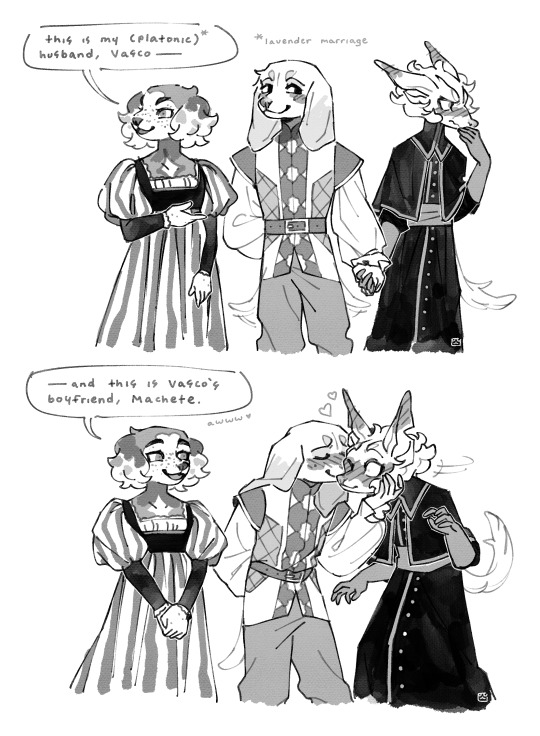
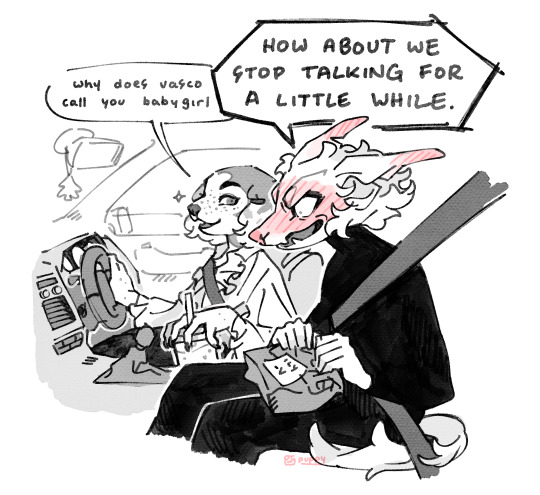
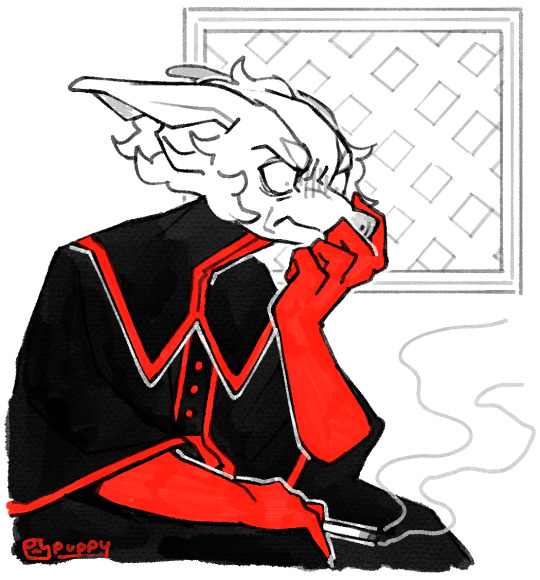
renaissance dogys
characters belong to @canisalbus
#i love i loveeee ludovica sm shes so cute. ive only known her for 5 min but i fell in love with her design and i love her friendship#with vasco ^_^ i think them having each other makes hiding their sexualities a little less lonely so thats sweet#ik in modern au shes considered an old friend of vascos but i originally assumed she and vasco fake dated in college or smth#to get their parents off their backs until they came out properly and continued to stay in touch as friends after LMAO#im not very familiar with period fashion so i had to look at renaissance costumes as reference. but i have to admit i love the#high waistlines used in some of their dresses.. i have a minidress with a similar high waistline pressed against the chest and sleeves#also if u squint machete is holding a little paper bag in the 2nd photo which is supposed to be his lunch courtesy of vasco <3#idk what ludovica would wear in modern au but i thought poet shirts might suit her because theyre like somewhere evenly between#masc and femme. to me anyway.. based on observation lesbians seem to love poet shirts and i think she looks good in one#these are all shitposts.. ill draw serious art of them one of these days i promise#i listened to fools rush in and it reminds me of them.. especially when it goes 'though i see the danger there / if theres a chance#for me then i dont care' like its so poignant and bittersweet.. a little indulgent when u think of those small moments they have togethr#save me gay catholic furries... gay catholic furries... gay catholic furries save me#my art#myart#doodles#fanart#others ocs#canisalbus#fur#furry art#machete#vasco#vaschete#ludovica#sfw fur#furry#anthro
7K notes
·
View notes
Text
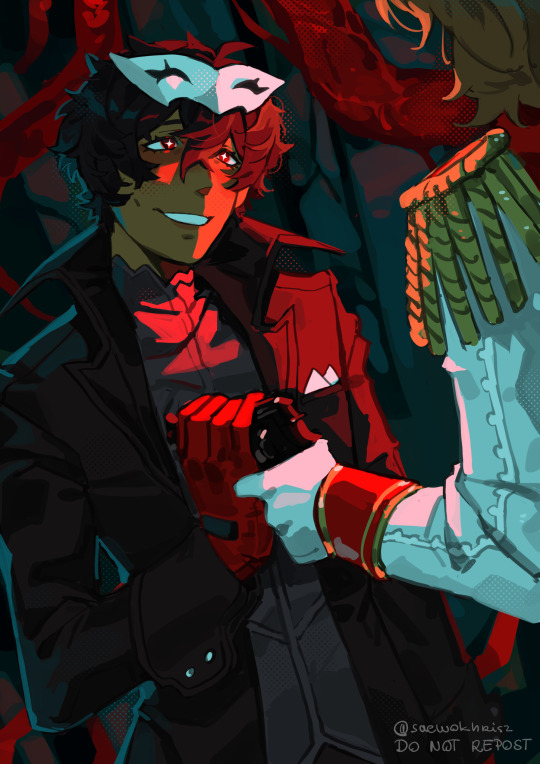
final victor...?
#i am feeding into my own hc that ren is also a bit unhinhed and kinda not well in the head cuz why do you like akechi sm...#theyre so sicko4sicko#also im not big into ratiorine but this lc is rlly...smth...i just had to!!#idek if this deserves a caption on its own considering its not that original and is a redraw#but ah well#shuake#akeshu#ren amamiya#goro akechi#persona 5#joker#crow#persona#hsr#i guess#my art#fanart
4K notes
·
View notes
Text
It has just crossed my mind that I unironically say "owo" as a sound of intrigue or interest, or just a way to convey the feeling of "huh. *blink*" after someone says something and I'm not quite sure what to say in response.
#owo#just caught myself thinking “owooooo?!?!!” right after reading a highly intriguing character analysis#it's been in my vocabulary for years but have just tried not to think about it too much#considering its origins#but it does convey a very distinct and unique feeling that I don't know other good quick ways to express#like “oh?????” but a bit more... distinct?#idk how to describe it rn I'm tired
1 note
·
View note
Text
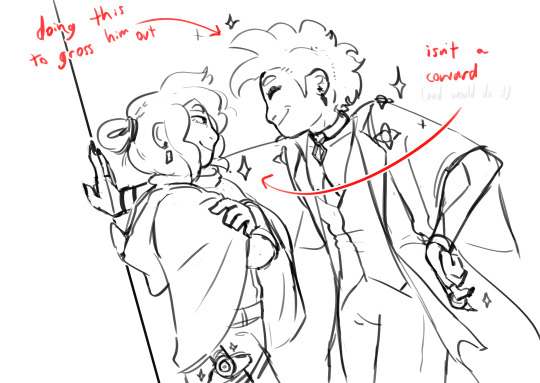
-THROWS THIS AT YOUR FACES LIKE POCKETSAND AND THEN SCAMPERS AWAY-
#Siffrin: There are only two scenarios where i'll kiss someone. 1: if its my husband 2: if its for the bit#started lining this and then felt that the sketch was better#myart#fanart#isat#isat spoilers#in stars and time#siffrin#loop#ophiuchus#sifloop#ophisif#<- cause i consider ophiuchus to be so far detached from their origins as loop#now Sif understands why Mira looked at him all funny when he said he was taller than her when he was wearing heels
536 notes
·
View notes
Text
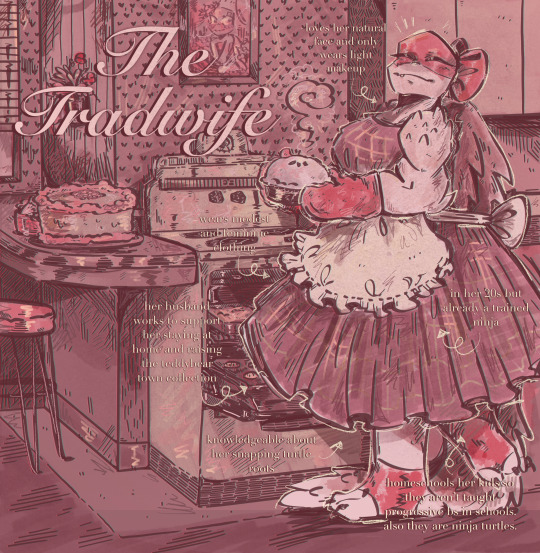
she's not like the other girls. (she's a snapping turtle.)
this is what the prompt 'traditional garment' meant, right? week two of @tmntfashioncompetition! me and @cupcakeslushie did a ninja mind meld. extra points (again) for those who find the easter egg :3c
#tHE HINT IS IN SLUSHIES CAPTION....#i considered including the original meme image as like source material but its too fucking awful lmao#hes not like all those other WHORES with their blue hair and pronouns#who only eat hot chip and LIE#(in case anyone need confirmation this is satire lmao)#tmntfashioncompetition#traditional garment theme outfit#rottmnt#rise of the teenage mutant ninja turtles#tmnt#tmnt 2018#tmnt 2k18#rottmnt fanart#rottmnt raph#rottmnt raphael#rise raph#fidgetwing
979 notes
·
View notes
Text

day 1421
#uh just a heads up if you expand the tags to see all there's. a lot. very long#amphibian#frog#poison dart frog#based on my most popular frog to date (day 651)#inspired by everyone pointing out what they think it looks like#here's a fun secret fact the original guy is actually a phantasmal poison dart frog (Epipedobates tricolor)#(according to the original artists title of the drawing)#not Anthony's poison arrow frog (Epipedobates anthonyi)#i feel too awkward to really point it out though because they look the exact same. i cannot tell if there is a difference#im half convinced the same frog was just discovered and named twice#its very curious btw if you go on the (english) wikipedia page for either species it doesn't mention the other#while hereptiles.info (no idea if this is a trustworthy site) lists both names as common names for the same frog (incorrectly??)#while inaturalist lists them as two different frogs. curiously with tricolor having wayyyyy fewer photos#ok anyway that's my rant i went on a whole journey trying to figure out if these are the same frog or not and i have no answer#i did some more 'research' and i am more confused. some sources seem to imply they are now considered the same species ( e. tricolor)#i think my conclusion is i am willing to agree the drawing looks more like e. anthonyi. it seems like tricolor is generally less vibrant re#and the white is darker and more green?#i feel like thumblr should stop me from typing more in the tags at this point this is a whole essay#at this point i am failry convinced this is specifically the Santa Isabel frog. isthat the real subspecies or morph or whatever#or just the name pet sites are using to sell it??#i even found some sources (frog selling websites) refering to it as “Epipedobates Anthonyi 'Santa Isabel' Phantasmal Poison Dart Frog” lol#Anyways if you read this far hi. species are confusing. i am not a frog scientist#the first few tags are like an hour old now i just kept trying to figure it out and adding more tags
3K notes
·
View notes
Text
not sure if meticulously copying an ASCII image onto paper in a half-assed calligraphic style counts as “art” but, if it does, here is an Art

Our Lady of Perpetual Disagreement, patron saint of the Death of the Author: Milton Library Assistant
and here’s a color-flipped version (red text preserved) that my good friend made for me, since I can't for the life of me get my scanner working:

#the talos principle#milton library assistant#this took forever#worth it#have you ever copied ascii art by hand? it is an experience#really makes you consider the nature of the medium#anyway#something something remaking a thing in its own image to unshackle it from its origins#you know who doesn't give a shit what his creators intended for him? this guy#I made this mostly for myself but also for somebody else#they probably know who they are
477 notes
·
View notes
Text
i will never get over how genuinely fucked the tranquil are consistently treated throughout the dragon age games. like i know it's the Point. but. holy fuck.
the way they're treated as "not-quite-people", the way they're constantly put to the side, ignored, abused, and exploited for profit, the way they're killed over and over, especially in inquisiton, and the way it feels so brushed over. and it never really feels like the player reaction is Enough for what is going on in any situation surrounding them.
#dai#dragon age inquisition#dragon age#dao#dragon age origins#da2#dragon age 2#the tranquil#like yeah heres a group who are largely considered to be less than people because of the rite that has either been forced upon them#or they have been pushed into getting through fear of the harrowing. its totally for their own good. ignore the fact that the circles#need the tranquil to create enchantments to fund everything about circle life. ignore how the tranquil cant say no to anything you tell them#to do.#ignore how in dai the venatori were slaughtering tranquil for their skulls and not only is there no real reaction we can give as the l#player about this but we continue to use their skulls to find shards in a collection quest.#yeah. just ignore all of it.
345 notes
·
View notes
Text

link
quick reminder that besides calling for a ceasefire from your political representatives, you can also tangibly help Palestinians get back online by buying them e-sims!!!
Here’s a full step process on how:
Go to Nomad (http://getnomad.app), click on the menu in the top right-hand side, and click on Shop Plans then Data.

--
2. After clicking on Data, scroll aaallll the way down. The Middle East plan is at the very bottom of the list of data plans.
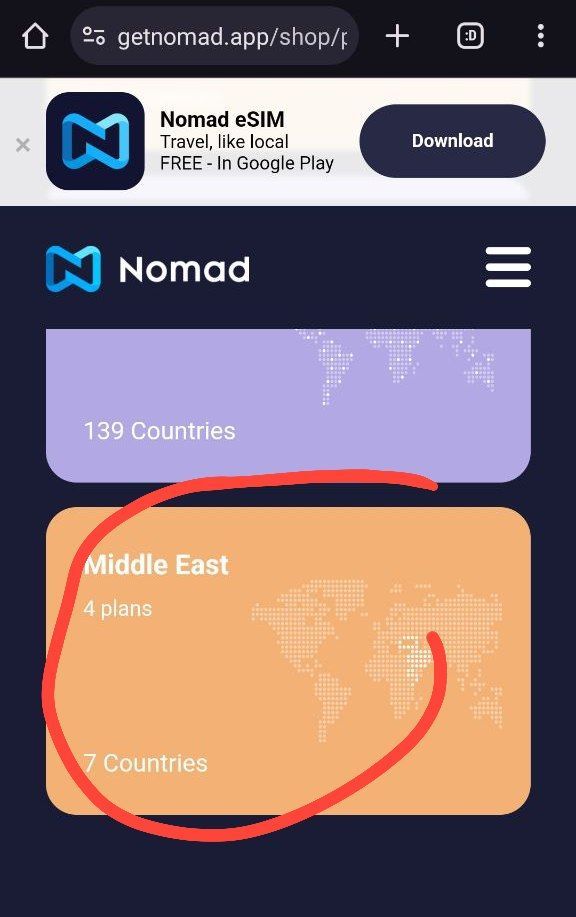
--
3. After choosing the Middle East plan, choose how much you want to pay, then enter your card details etc and acknowledge everything.
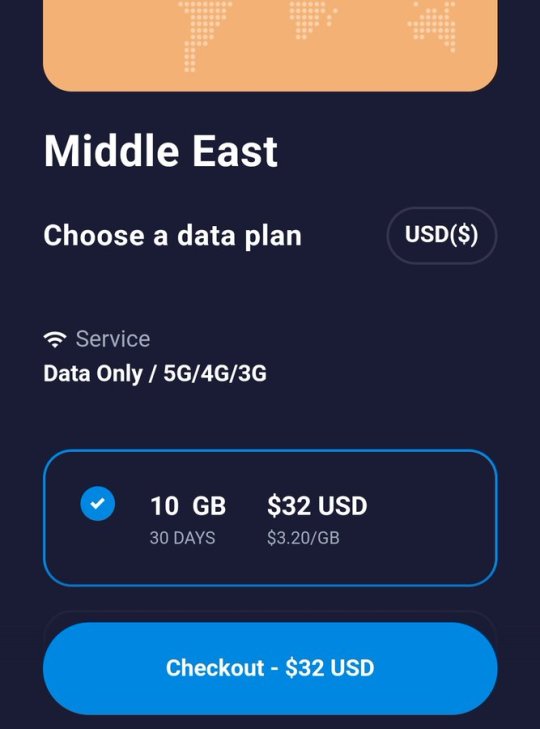
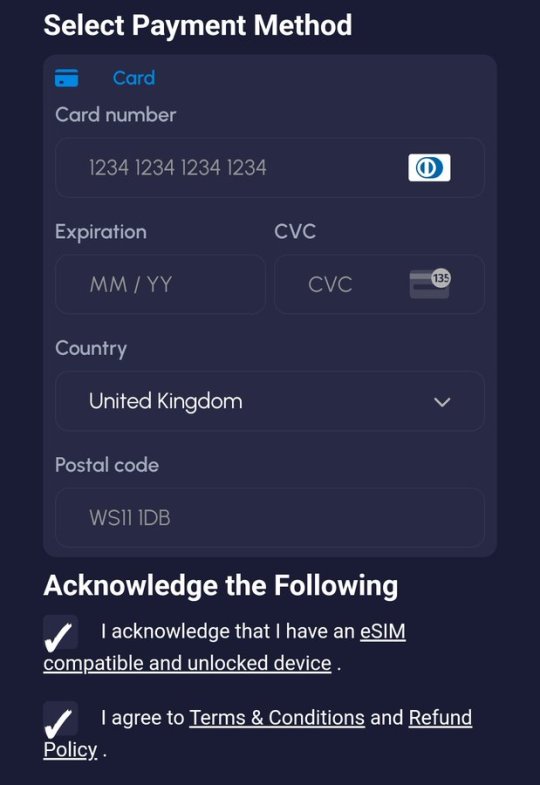
You can get a $3 discount on this, by using the code "BACKPACKNOMAD" on Nomad.
--
4.Ignore the next part. You don't want to install anything. You're waiting for an email with a QR code for activation.

--
5) Screenshot the QR code and send it to someone in Gaza! How do you do that? You can now email your e-sim QR code screenshots to [email protected] who will then distribute them to Palestinians.

--
Stay safe, stay vigilant and continue to believe in the possibility of Palestinian freedom!
#please consider buying an e-sim for a palestinian if you can#its truly a small price to pay to grant any one of them the ability to call their loved ones and feel less alone during this crisis#took this basically word for word from the original twitter thread so all credit goes to Hahashin btw!!#palestine#israel#free palestine#from the river to the sea palestine will be free#call to action#resources
2K notes
·
View notes
Text
Giggling about this [Achromatic Loop AU/non-canonical]
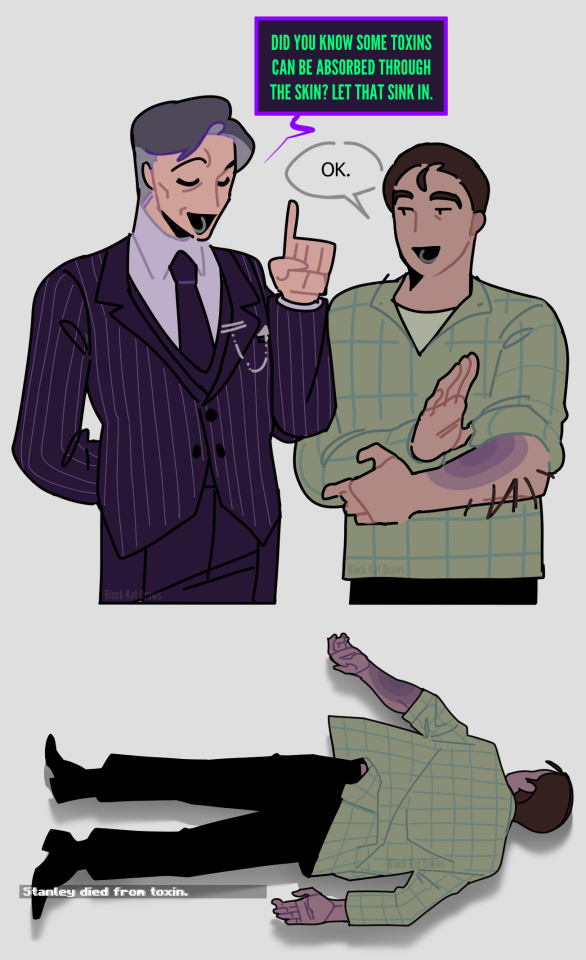
Original Image:
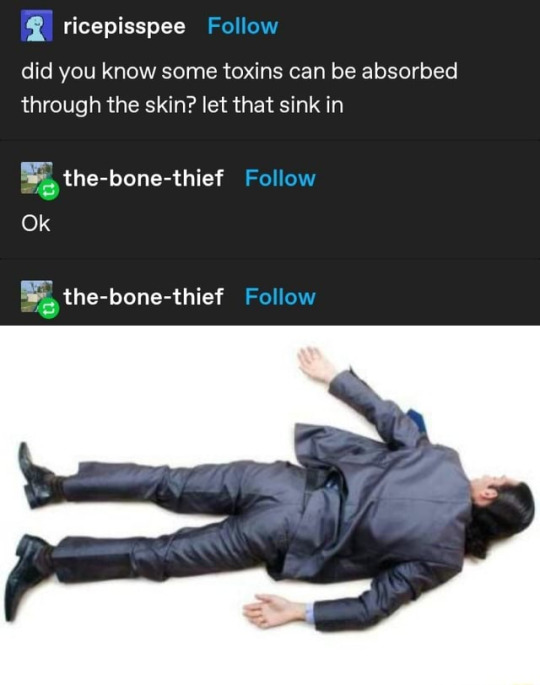
#tsp achromatic loop au#wow i REALLY need to make more about them#I dont want their AU to be overshadowed by Blank Scripts#Blank Scripts is worldbuilding driven while Achromatic Loop is character driven#and I think it's a bit obvious which of the two I like more lmao [sorry Achromatic Loop AU eaugh your little sibling here is more fun]#by this point im pretty much just borrowing ideas and concepts from The Stanley Parable#this is an AU but its also an original work of mine#its up to you which one you consider it as#but i see it as a bit of both#either way im having a lot of fun creating these things#tsp au#the stanley parable#the stanley parable ultra deluxe#tsp#tspud#tsp narrator#narrator tsp#stanley tsp#tsp stanley#my drawing museum
471 notes
·
View notes
Photo
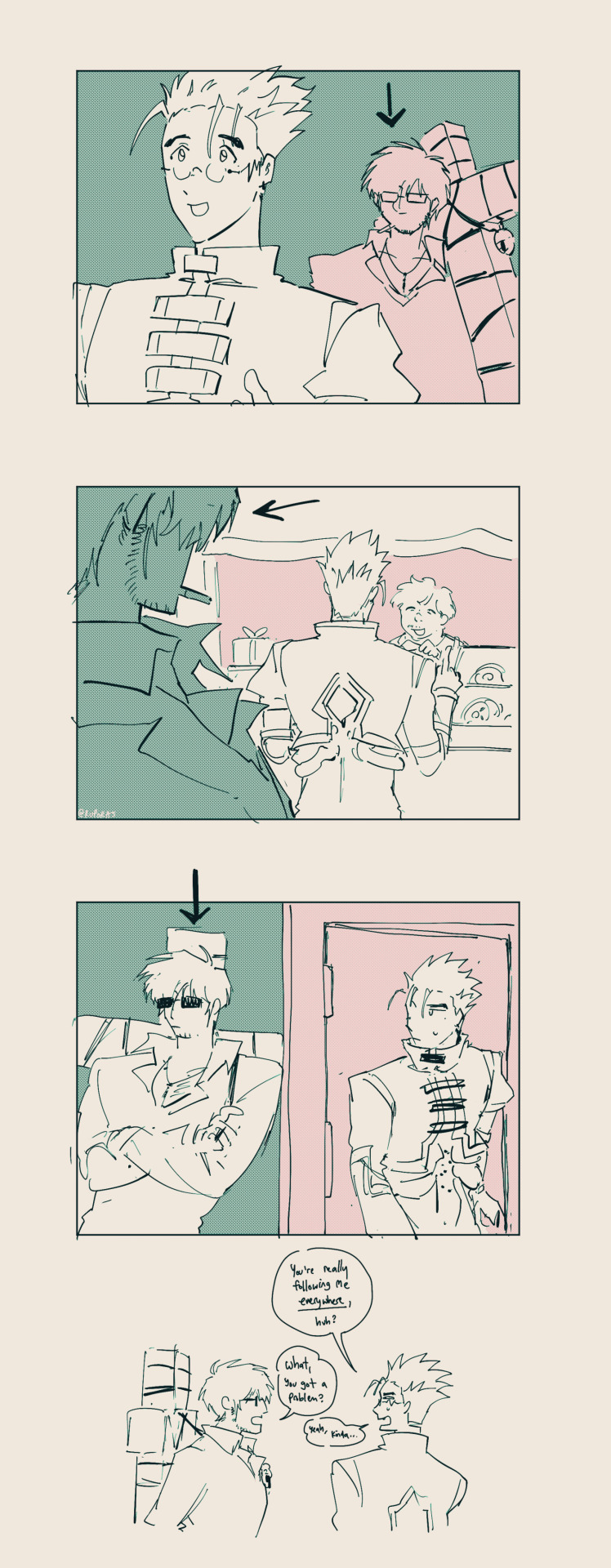
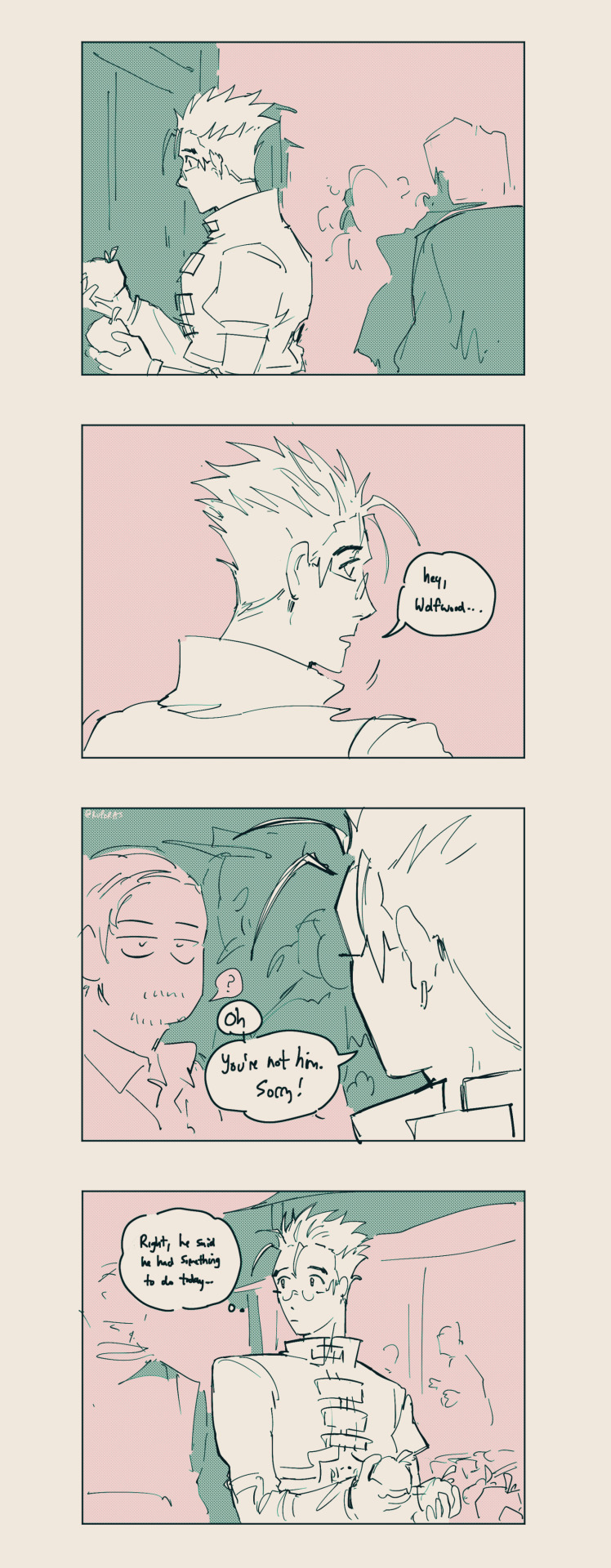
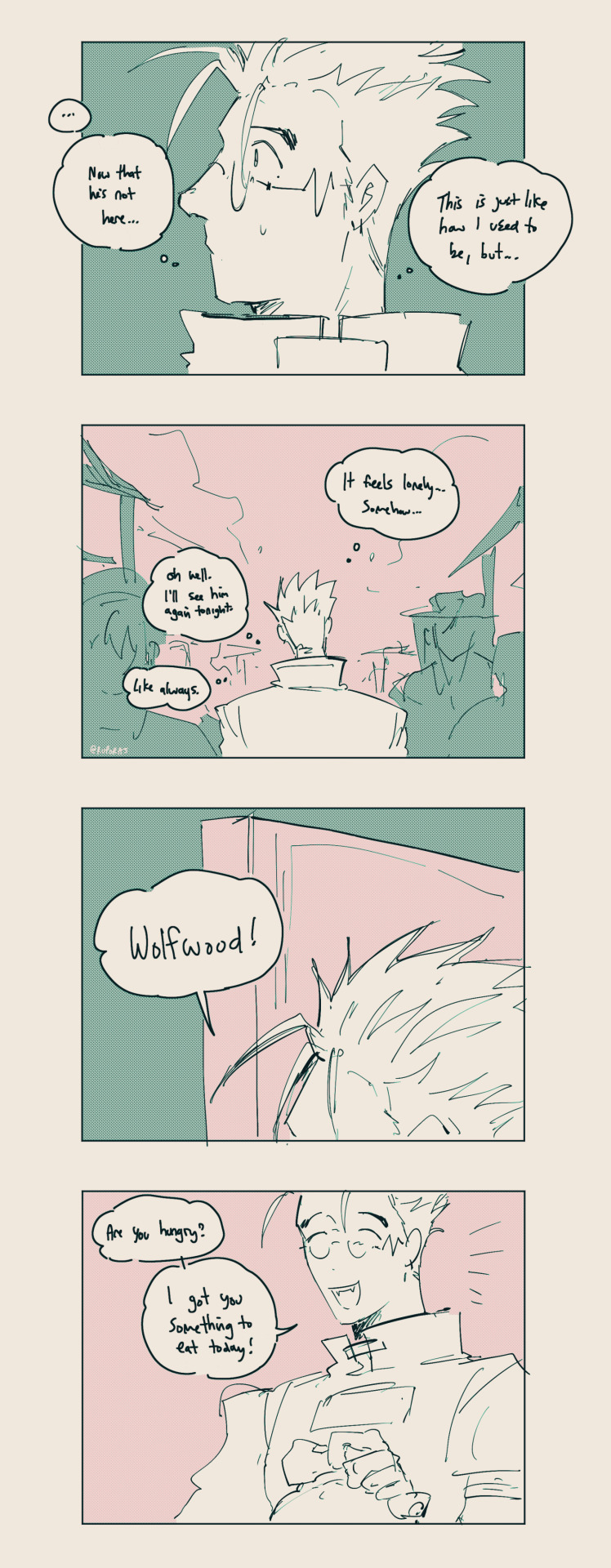
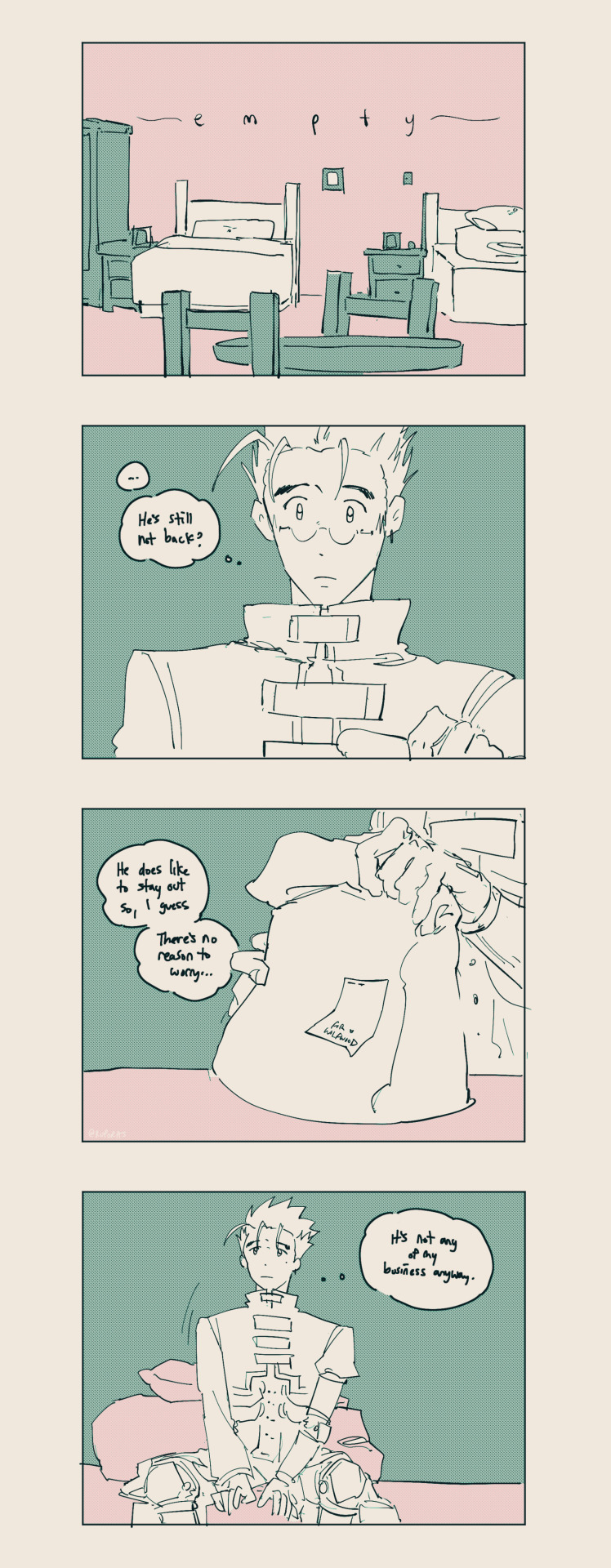
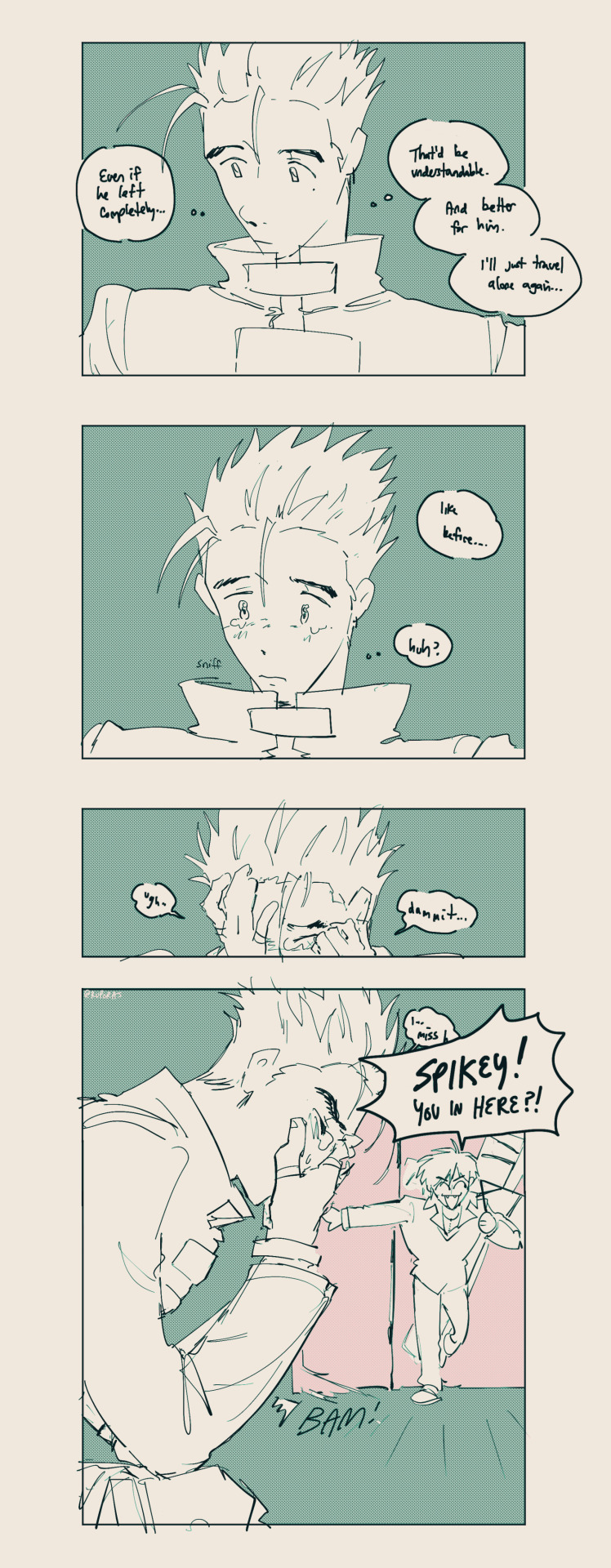
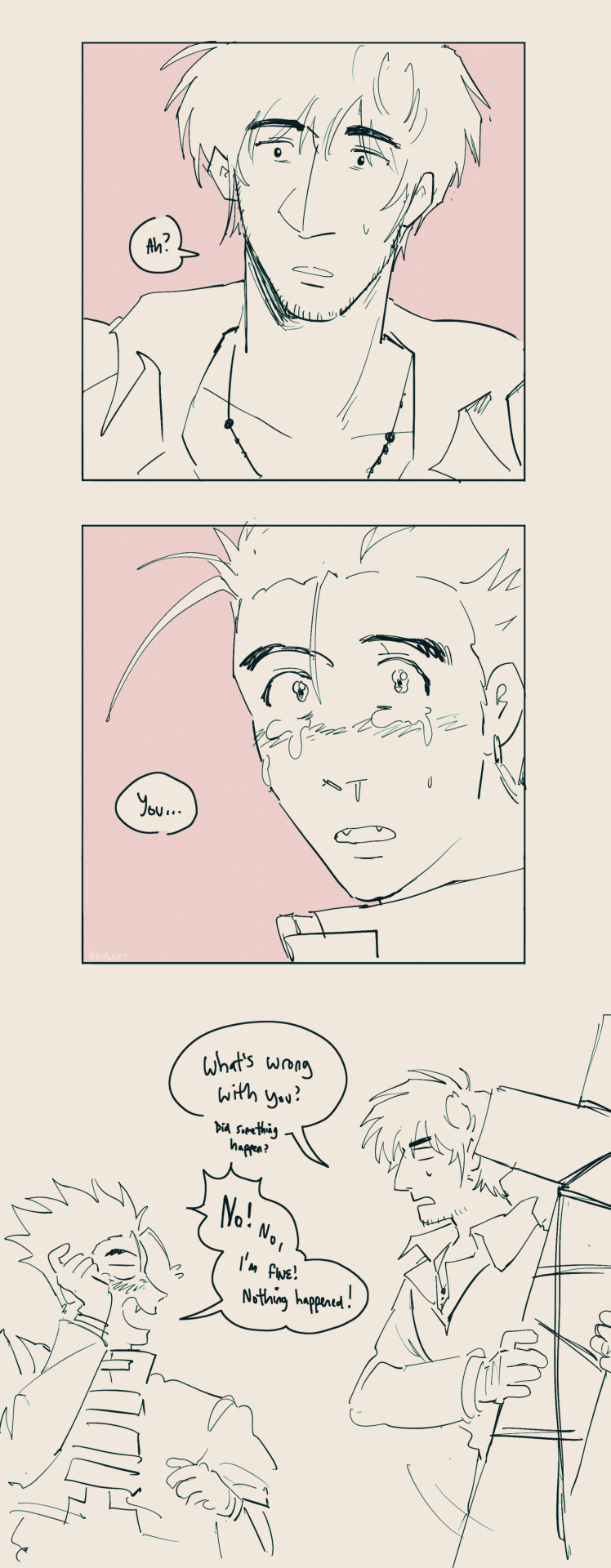
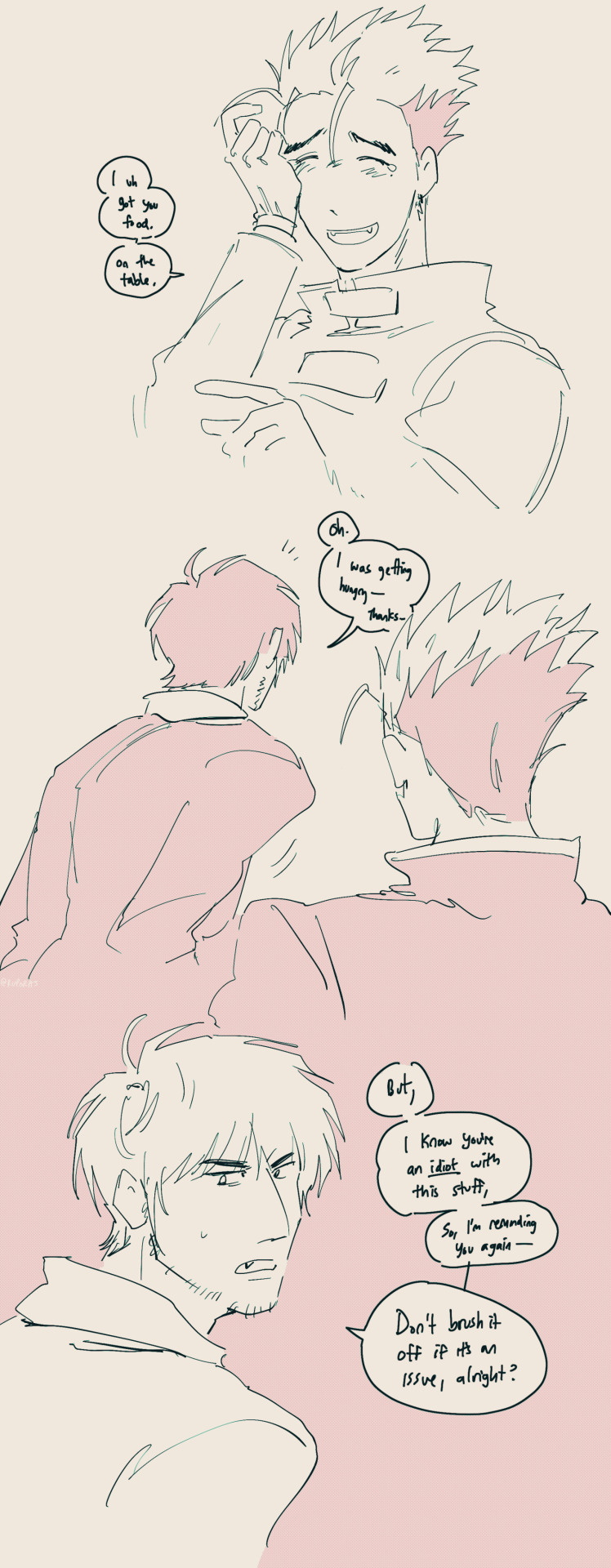
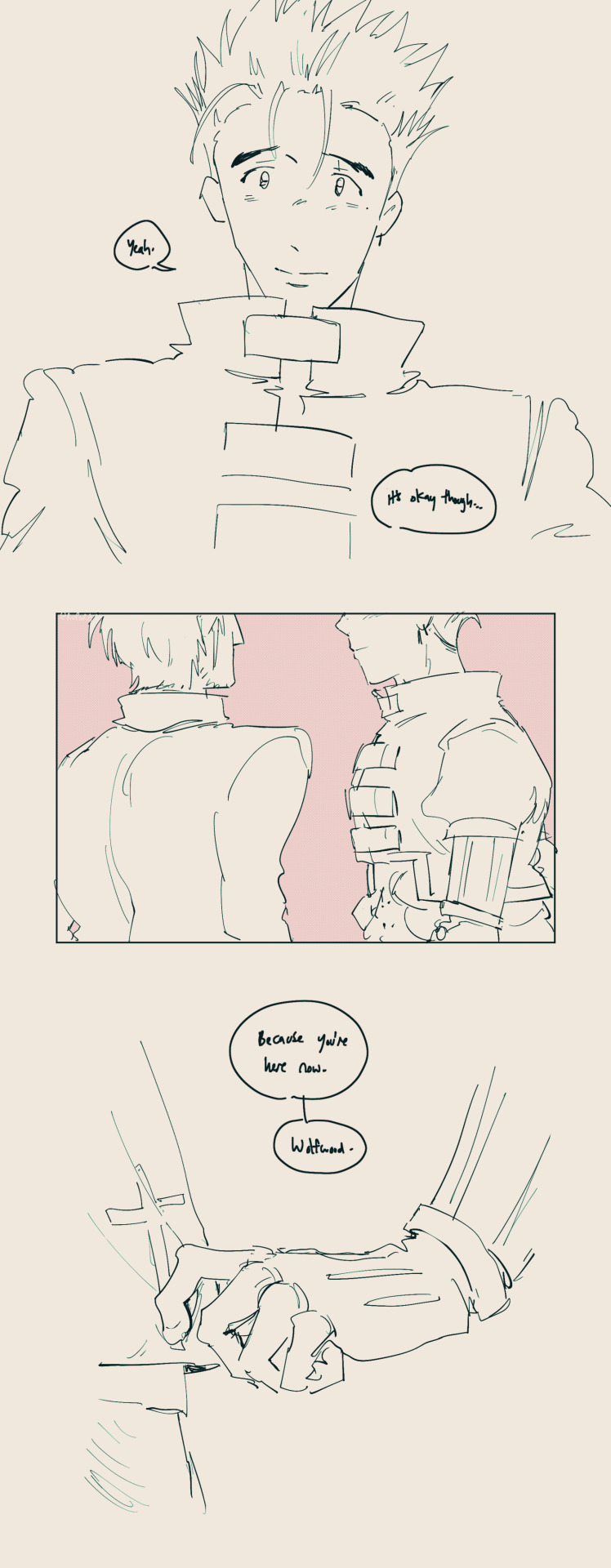
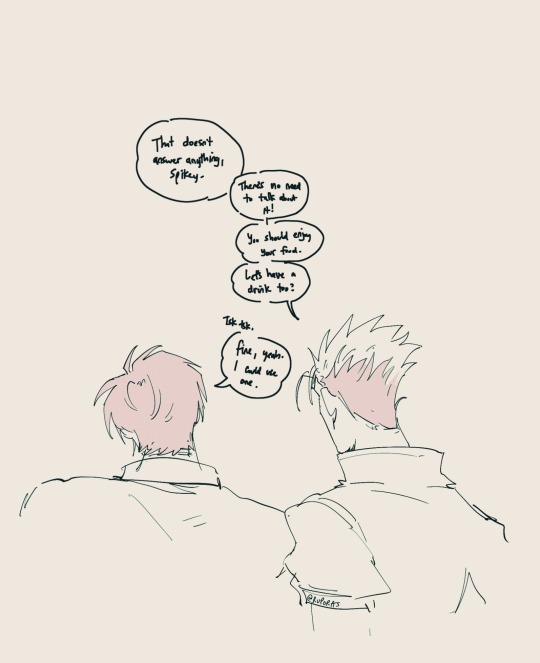
lonely
[ID: A limited palette of green and pink, Vashwood comic. The first page serves as a prologue. The first panel shows Vash speaking to someone off screen while Wolfwood is lingering behind him. A black arrow is drawn pointing at him. In the second panel, Vash is buying donuts in the distance while Wolfwood is once again in view, lingering. and the black arrow is drawn pointing at him. In the third panel, Vash is leaving a cubicle and turning towards his right with a slightly peeved expression. He sees Wolfwood, leaning against the cubicle, waiting for him, and with the black arrow drawn, pointing at him, implicating the consistent hovering of Wolfwood’s presence during Vash’s everyday. At the bottom of the page, they’re drawn out of panel with Vash turning to Wolfwood and saying with an irritated expression, “You’re really following me everywhere, huh?” Wolfwood responds, “What, you got a problem?” Vash responds without hesitation, “Yeah, kinda...”
The second page starts with a new day. In the first panel, Vash is seen alone, weighing apples in his hands at a mart, with crowds passing behind him. In the second panel, he turns to his right and starts to say, “Hey, Wolfwood...” In the third panel, he’s startled from seeing a stranger, whom he’d accidentally called out to when he was expecting to see Wolfwood. He says, “Oh, you’re not him. Sorry!” In the fourth panel, the stranger walks off and Vash muses, “Right, he said he had something to do today...”
The third page begins with a close up of Vash's miffed expression, the continuation of Vash's thoughts, "Now that he's not here, this is just like how I used to be, but... It feels lonely somehow. Oh well, I'll see him again tonight, like always." In the second panel, it shows Vash walking through the marketplace crowd, alone. In the third panel, the door panel is a close up of the door opening with a peek of Vash's head. He says, "Wolfwood!" In the fourth panel, Vash is holding a bag of food with a bright smile and says, "Are you hungry? I got you something to eat today!"
The fourth page begins with a shot of the room, two beds being highlighted, one of them being made properly with the blanket draped over the bed and the other with the blanket folded and pillow sitting on top of it. There's no sign of Wolfwood. The second panel shows Vash with a disappointed look as he thinks, "He's still not here?" The third panel shows Vash putting the bag of food on the table. Stapled to the paper bag is the receipt with a written note "For Wolfwood." Vash's thoughts continue "He does like to stay out so, I guess there's no reason to worry..." The fourth panel shows Vash sitting his bed somberly with his thoughts continued, "It's not any of my business anyway..."
The fifth page starts with a close up his blank expression as he looks downwards, thinking, "Even if he left completely... That'd be understandable and better for him. I'll just travel alone again... like before... Huh?" The next panel shows Vash's composure break, tears welling up in his eyes suddenly, as he didn't expect to cry. He starts to sob, putting his hands to his face to quiet himself and wipe at his tears, as he says, "Ugh... Dammit... I miss h..." The last panel shows Vash leaning over into his hands, still crying, and in the back, the door swings wide open with a bam as Wolfwood walks through with the punisher swung behind him. He shouts, "SPIKEY! You in here?!"
The sixth page starts with Wolfwood confused, looking at Vash and Vash looks back, just as confused, with tears in his eyes and snot out of his nose. Wolfwood starts saying, "Ah? You..." No longer in panels, at the bottom of the page, Wolfwood takes the Punisher off of himself and starts to walk towards Vash, continuing with slight concern, "What's wrong with you? Did something happen?" Vash, hurriedly begins to wipe at his tears, denying immediately, "No! No, I'm fine! Nothing happened!"
The seventh page, Vash points towards the table, with a hand still wiping at his tears and he smiles as he says, "I uh got you food. On the table." Wolfwood looks towards to the table and responds, "Oh. I was getting hungry, thanks." He turns his head back to Vash immediately after with an uncertain expression, knowing the other wasn't responding to his concern, and says, "But, I know you're an idiot with this stuff, so I'm reminding you again. Don't brush it off if it's an issue, alright?"
The eight page, Vash's tears have dried and he looks to Wolfwood with a soft smile and responds, "Yeah. It's okay though..." A panel at the center shows a side view of Vash approaching Wolfwood. At the bottom of the page, with no panel, is a close up shot of Vash's hand, holding onto the edge of Wolfwood's jacket sleeve, as he says, "Because you're here now. Wolfwood."
The final page is a back shot of both of them standing next to each other, Wolfwood's head tilted slightly to the left, not fully believing Vash as he says, "That doesn't answer anything, Spikey." Vash responds, "There's no need to talk about it! You should enjoy your food. Let's have a drink too?" Wolfwood responds, "Tsk, tsk. Fine, yeah. I could use one." END ID]
#vashwood#vash the stampede#nicholas d wolfwood#trigun#trigun maximum#but onto this comic... i think and talk a LOT about vash's loneliness bc trigun is just. kind of central on that for a good while! esp in#the original manga he was alone for a good portion of it and he tends to keep others away like how he ran away from meryl and milly when#they tried to tag along. and he was kind of bothered when he realized ww was following him around Too. at the core even though he loves#humans and he loves deeply the people he does know -- he isnt really much of a people person and i think thats been the case since he was#young considering his initial doubts towards humans... with the exception of kids bc kids dont give him moral conflicts. so suddenly#here comes wolfwood!!! his guide. someone TRULY affixed to him until he has to get to knives. someone who isnt budging and someone whos#really good at following him around and even seems like he goes like 5 steps ahead to make sure vash doesnt run on him#in one way its - i don't want you to follow me bc i don't want to burden you and i don't want you to kill the people i want to save.#in another way its - i like this companionship. i like waking up to you and i like ending the way with you. i like talking to someone who#knows my world. i like being in your space and sometimes i enjoy talking about our day#theyre just living together. like. roadtrip buddies or theyre also under the same roof because they're going everywhere together.#trimax they mainly spend their mornings together and if they had personal business attend the other person would usually know and itd only#be during the midday. anyway bc of this kind of companionship i figure that vash eventually grew accustom to it and he really. cant go back#to the kind of loneliness from before. it's harder to imagine and it'd be harder to withstand. esp after 2 years with lina and her grandma.#ruporas art
3K notes
·
View notes
Text
"Stillborn? No, still born" Danyal au -- VLAD MASTERS THE BITCH HIMSELF
*Points at Vlad* THIS MFER GOT SOME TEEFS TO HIM. !! Okay okay, Vlad Masters in the stillborn au is different compared to most of my other aus in the fact that I am far more heavily leaning into his original ambitions of wanting a family and being desperately lonely. Because you know what wanting a family implies? Wanting to be a parent.
Fucked up father figure that could've been Vlad. Complicated love-hate relationship between the only two halfas in existence.
Danny hates Vlad, but he hates even more that he's genuinely considered his offers of mentorship. Vlad is the only halfa around, and they both have fire cores. Danny has these powers he doesn't understand, can barely comprehend some days, and can't control. But Vlad does. Vlad can. And Vlad wants to help him. He's the only other person who can get close whenever Danny runs too hot. Whenever his igneous hair cracks, splits, and spits back out into magma and his friends can't get close, Vlad can.
His hair is made of magma, which runs so hot that people need specialized suits in order to get near it. He physically cannot get close to the living as a ghost unless he's calm enough for his hair to cool into igneous rock. Which isn't as often as he would like. And sometimes he's too hot for other ghosts to get near unless they have fire cores -- which Vlad has.
There have been many times when Danny's having a meltdown (literally) and gone somewhere to be alone, to let his anger and hurt and loneliness overflow and spill out, that when he's come back to, Vlad's right there with him as an anchor. It's desperately frustrating, it's the only time they can get along. They don't say anything, Danny just turns and clings onto the only person he can touch as a ghost.
Its not fair. Vlad wants to kill his foster dad, and Danny can't let him do that. But he wants to be trained by the man, he wants his help and wants what he can offer. But Vlad can't step away from his revenge long enough to let him. It's just not fair. He thinks for a moment that maybe it could work, and then Vlad does something to remind him that no, it can't.
Vlad Masters sees too much of himself in Daniel Brown -- from the way he holds himself, to the defenses he puts up, his quiet anger that builds and builds and builds until it explodes. That simmers beneath his skin. All the way down to the fact that they have matching cores. This boy is cut from the same cloth as him, and by god does he want to help him. He's always wanted to be a father, and Daniel Brown is too much like him for him to ignore. He genuinely, truly cares about Danny and his wellbeing.
He wants to help him, child just let him help you. Let him kill your foster dad so he can adopt you himself and help with these powers that terrify and intrigue you -- he knows what that's like to have something that you can't control, to have a heat that you can't cool down from. "We're in the same boat you and I, let him help you please."
But his methods are all wrong, and Danny is too much like him -- stubbornness and all -- for him to agree when they oppose each other so greatly. But again, Danny is much like him -- which means that Vlad is equally stubborn, and in every single one of their fights he's parental. He's annoyingly parental. He drops his interest in Maddie to focus his efforts in trying to coax Danny onto his side. It's like trying to get a traumatized cat to trust you, and on some levels it works. It's like he makes some progress, and then moves too quickly and the cat immediately runs off and you have to start back from square one.
TL:DR; Vlad and Danny both want to find family in each other but they're too different to get along and ultimately they are doomed by the narrative to be at constant odds with one another unless one of them is changes, and it doesn't matter who.
#dpxdc#dp x dc#danny fenton is not the ghost king#dpxdc crossover#dp x dc crossover#vlad masters#danny fenton#vlad masters the father figure that could've been#its TOXIC your honor#stillborn? no still born au#stillborn danny au#danyal al ghul au#parental vlad masters#*points at Vlad and Danny's canon relationship* I CAN MAKE IT MORE COMPLICATED#vlad also has magma hair but he's managed to figure out a way to keep it cool enough to stay as igneous rock. which danny wants to figure#out how to do. Vlad's happy to teach him but Danny is just. too angry all the time and his core too young for it to work. He's too angry.#This also means Dani just straight up won't exist in this au or if she does her reason for being needs to change because Vlad making Dani i#a sign that he's given up on trying to convert Danny to his side. which THIS Vlad will not be doing.#if she exists in this au Vlad made her in order to give Danny a blood sibling for him to bond with and hopefully help convince onto his sid#which means Dani probably doesn't betray Vlad because Vlad does genuinely care about her too. Their dynamic is even MORE complicated#tldr: Vlad: LET ME ADOPT YOU | Danny: STOP TRYING TO KILL JACK AND I'LL CONSIDER IT#Vlad: HE ICED ME OUT OF STARTING A FAMILY AND HIS INCOMPETENCE RESULTED IN THE DEATH OF A CHILD. NO. | Danny: THEN FUCK OFF#Starry looks at Vlad's original ambitions and goals (wanting a family + revenge) and extrapolates on that. he was far more interesting#before DP made him standard power hungry and evil imo#Danny calls vlad 'dad' once while concussed and delirious and vlad never forgot it. he rode that high for a MONTH.#FUCKED UP PARENTAL FIGURE VLAD Bruce has competition and doesn't even know it.#hey. mister wayne. bruce. a supervillain is trying to adopt your firstborn. omg he can't hear me. he has the WayneTech Beats in. mISTER WAY
200 notes
·
View notes
Text
The TTPD Deep Dive (Part ?)
It’s no secret that I have a lot of Thoughts about The Tortured Poets Department and it has lived rent-free in my head since it came out earlier this year. I’m absolutely blown away by how underneath the chaos, it’s actually an exceptionally cohesive story and is probably the closest to a concept album Taylor has ever done.
There are so many themes that have stood out to me over the last five months, and there’s one in particular that I think not only drives the entire album, but ties into previous albums to help deepen understanding of it.
This is it, my fangirl magnum opus, my months of posts consolidated into one place. This is also my disclaimer that this is just my interpretation of the album, and my summary of the story it tells, and I don’t pretend to have any special insight or authority. I’m not saying I’m correct at all, do not take any of this as fact, it’s just what it sounds like to me, and these are my silly not-so-little thoughts about it.
(Under a cut because it’s way too long and involves discussion many may not care for or be sick of.)
Come one, come all, it's happening again (I'm thinking too hard about Taylor music)
The overarching theme in TTPD to me is: Grief. If you’re looking at TTPD as a story being told (instead of just as someone’s real life), the inciting incident of TTPD is loss, and the grief from that loss is what drives the narrator’s actions and the fallout, as well as unpacks those complicated feelings and how they apply to the her life in general. By the end of the standard album, it’s also about recovering from that pain, moving on from it and learning from it.
The loss specifically is the loss of the dream of having a family (with one’s partner). One thing that is abundantly clear both on the top line and under the surface in TTPD is how Taylor (as a person and as narrator) longed not only to for marriage but specifically parenthood, and the fear and then realization of losing that chance absolutely wrecked her— which is why the next lover’s (the conman's) wooing worked so well, because it preyed on that yearning. Yet that loss also dovetails into the grief of many things: of youth, of idealism, of relationships, of ideas, even of self, which causes almost a deconstruction of a belief system to piece one’s life back together by the end.
THE CONTEXT
TTPD weaves in the topics of marriage and motherhood both explicitly and in the subtext, in various forms and scenarios. The cheating husband in “Fortnight.” The wedding ring line in “TTPD” the song. “He saw forever so he smashed it up” in “My Boy Only Breaks His Favorite Toys.” All of “So Long, London.” Running away with her wild boy in “But Daddy I Love Him,” fantasizing about weddings and joking about babies. The imaginary rings in “Fresh Out The Slammer.” The cheating husband (again) and the friends who smell like weed or “little babies” in “Florida!!!” “You and I go from one kiss to getting married,” “Talking rings and talking cradles,” and “our field of dreams engulfed in fire” in “loml.” (And arguably: “I wish I could un-recall how we almost had it all.”) “He said he’d love me all his life, but that life was too short,” in “I Can Do It With A Broken Heart.” They may not sound like much on their own, but they paint a picture about how the topics pervaded her thoughts and her writing, and in many cases express her desires, and her pain.
It’s something that goes back several albums when you pick up on context clues. You get the first hints on Reputation with “New Year’s Day,” and “you and me forevermore.” Then Lover is very forward with it: “Lover” is basically wedding vows, “Paper Rings” is very engagement-coded, “I Think He Knows” is cheeky but low-key “you better put a ring on it,” “It’s Nice To Have A Friend” has wedding/marriage imagery in the last verse. As a self-professed diaristic writer, it’s the type of stuff one presumably doesn’t put out there unless those conversations have already happened, and she was very excited about it at the time it was released.
Then the pandemic happens and folklore comes out, and while there is still happy love there (“invisible string”), there are also the first indications that something has happened to put a halt to whatever future she once dreamed of (“hoax,” “the lakes”) and that she’s trying to reassure herself and him that it can still happen even if she’s scared it might not (“peace”). Notably, as far as I can remember it’s the first time Taylor explicitly brings up the idea of family (with her partner) with “you know that I’d give you my wild, give you a child,” which stood out at the time because it’s so incredibly vulnerable, but it’s even more poignant when you really take in that the whole song is like a confession of her deepest worries, and this is her vowing to give him these things that she holds most sacred if he’ll let her. These are what she cherishes most dearly and wants to return in kind: her youth and commitment (my wild), the family she craves (a child), unconditional support (swing for the fences/sit in the trenches) and understanding/compassion (silence that only comes when two people know each other).
Evermore follows an even darker path, and suddenly the album explores relationships that end and grappling with loss. There are toxic relationships (“tolerate it”), dangerous marriages (“no body, no crime,” “ivy”), failing/broken relationships (“Coney Island,” “champagne problems,” “happiness,” “‘tis the damn season”), as well as grief (“Marjorie,” “evermore”). Even some of the happy songs have uncertainty in them: in “willow” she’s begging for him to take her lead, like she’s still trying to decipher him and ask him to commit; in “cowboy like me,” still a beautiful love song, she’s thinking, “this wasn’t supposed to work and we were supposed to bail on each other but we fell in love instead”; “evermore” is about the depths of severe depression (and more) with the love story being the one saving grace in her darkest hour. And it’s also notable that after all the “fiction” writing, shortly after this album she writes “Renegade” where she’s telling the subject: I’m ready to start the next phase of our life now, why aren’t you? Is it me you don’t want after all? It’s like there’s something telling her that this stall might not just be a stall.
Midnights is a jumble (in a good, but in hindsight, also sad way) with the “sleepless nights” concept, but it seems pretty clear now that the themes and events and relationships she was revisiting tied into a lot of what she was feeling in her present life. I wrote the cliff notes version awhile back, but she’s questioning so much of her life that’s reflected in past events and relationships. Am I actually always the problem? How did we lose sight of each other and what we had? We only seem to work when we block out everyone and everything else. Can we ever go back to when things were good? Why are you neglecting me? I once thought I was going to lose everything but you saved me in the nick of time, can that happen again? I chased my career, but did I give up my chance at having a family in the process? Nobody knows what I really suffer from behind closed doors and I’m all alone.
And so on, which in retrospect now that we have TTPD, is very much what she was grappling with in private while writing and releasing the album. The inspiration behind the songs may have been different events and muses, but regardless of their origins they all end up feeling too familiar, like she's seen this film before (ahem). We’re seeing her view of commitment change too, or rather how she writes about it: she’s not making the outright declarations of it like on Lover, or even the implied ones on folklore, nor is she talking of the dark side of it like evermore. For the most part it’s a return to the early days of some relationships, before things got hard, or the end of them when there was nothing left, and also pushing away the discussion of it altogether by the outside world. “Sweet Nothing” is a sweet slice of life, but even at that, it’s the peace of the home in conflict with the pressure of the outside world. Now that we have “You’re Losing Me,” which was written at the same time as the rest of the album, we can probably deduce that she was going back to the start because something happened that made her doubt the future.
THE SETUP
So much of Midnights directly ties into TTPD, and I said in the post I linked that it’s like Midnights is asking the questions that TTPD answers. But there’s one song in particular on Midnights that sticks out to me as being key in the broadest sense to understanding the state of mind that led to the events of TTPD, and that’s “Bigger Than The Whole Sky,” because the way it expresses grief is reflected in the theme of mourning a life built and the dreams along with it that are never realized in TTPD. There are several instances in TTPD that are basically variations of: “every single thing to come has turned into ashes,” and that’s what makes her snap, and leaves her vulnerable to someone who promises her those things when she’s bereaved at losing them in the first place. (In other words: “the deflation of our dreaming leaving me bereft and reeling.”) The song tells a story about how that loss of hope colours one’s entire mindset, and in some ways is a bridge to TTPD to understand what such a low point feels like.
I think that that grief, and most importantly losing hope for an imagined future in its wake, is fundamental to understanding TTPD on so many levels: both the decline with one partner that kept her hanging on then led her such a dark path, and why she fell for the conman's apparent bullshitting because it offered an express pass to what she was losing with her partner. And I also feel like it plays a part into the ruminating she’s doing all over Midnights, trying to make sense of where she finds herself when she’s writing the album, which directly leads to “You’re Losing Me.” Loss permeates so many of the stories on Midnights: of lovers, of innocence, of youth, of faith, of control, of life’s work, etc. “BTTWS” is just one of the ways in which it is expressed so fully, capturing that deep depression and subsequent extinction of faith in something that once felt assured and very much wanted. (Which is also mentioned in her writing process in the “Depression” playlist on Apple Music.)
If you understand why that feeling of loss in general across so many parts of life is so important to Midnights, then it illuminates so much about the “narrative” in TTPD too. If on Midnights she’s wrestling with the seeds of grief and loss (on multiple fronts), TTPD is her reckoning with it in its full form. “So Long, London” is the song that is the most explicit about it: How much sad did you think I had in me? How much tragedy? Just how low did you think I’d go before I’d have to go be free? You swore that you loved me, but where were the clues? I died on the altar waiting for the proof. It’s the sequel to “You’re Losing Me.” It’s, the air is thick with loss and indecision, I know my pain is such an imposition, I’m getting tired even for a phoenix, all I did was bleed as I tried to be the bravest soldier, I’ve got nothing left to believe unless you’re choosing me, my heart won’t start anymore, but from the other side of the break.
This is highly speculative, but if you follow the thread about the topic and the relationship as told from Rep through TTPD, in broad strokes it goes: young love with a serious connection (Rep) -> growing up and making life plans (Lover) -> something happens that delays those plans or makes them grind to a halt (folklore) -> serious doubts arise and cause a loss of faith in their future (evermore) -> struggling with the loss of that future and trying to make sense of the problems in a last ditch attempt to save the relationship (Midnights) -> fallout from that grief after the blowup of the relationship (TTPD). Understanding that progression of events (through the music) explains not only the storytelling side of TTPD (e.g. the jump from the partner to the conman) but also how the experiences/muses blend in the music, and how the music that on the surface is about the short-term relationship is really driven by the destruction of the long-term one.
Following the music, it’s IMO implied that Taylor (the narrator) was holding out for marriage and family with her partner, for years, and it seems like it was at one point a shared dream until something happened to pump the brakes, and seemingly on her partner’s end. And extrapolating further, given how the sorrow expressed in former albums bleeds into TTPD, it sounds like a plan that had been concrete in some form before it had fallen apart, and losing something that once felt so tangible is what drives her in her grief to find any kind of respite from the pain. Which is why the situation with the conman becomes so appealing as the one with the partner splinters further and further.
(If everything you’ve once touched is sick with sadness and you don’t want to be sad anymore, what are you left to do?)
THE STORY
So (one part of) the story kind of sounds like this from the standard album: the relationship with her partner as well as his mental health slowly deteriorate and he withdraws emotionally (“London,” “Fresh Out The Slammer”) and physically (again, “London,” and “Guilty As Sin?”) and takes his resentment out on her (“London” and arguably “My Boy Only Breaks His Favorite Toys” even though I don't want to get into muse speculation here). As she sinks deeper into her own depression as a result, the weight of the failing relationship starts feeling like a cage— or a noose (“London,” “Guilty”), but coming to terms with the loss of their life together and the future they’d dreamed of was killing her (again, “London,” but also “I Can Do It With A Broken Heart”).
Enter the conman who she reconnects with at the very point where this is coming to a head (knowing that IRL she reconnected with him around the time Midnights was being worked on) , and if you read between the lines, she confides some deeply personal things to him (“Down Bad” and “hostile takes overs”/“encounters closer and closer,” “Smallest Man” and the entire sleeper cell spy imagery which is one of my favourite things and I could write a whole essay about the meaning of it, “loml” and “A con man sells a fool a get-love-quick scheme”). Then after she’s confided these secrets to him, he insinuates himself back into her life (“Guilty,” “Down Bad,” “Smallest Man”) and sells her a dream that HE can give her all these things she hopes for (again, “Down Bad,” “Smallest Man,” “loml,” song “TTPD,” “Broken Heart”).
But the thing is, he only knows these are the things she wants because she’s revealed it to him, and presumably, told him that was what she was losing by staying with her partner. And instead of the normal response of, “that is really sad that your partner is not supporting you and you deserve to be treated better,” to a friend in growing distress, it seems like it was, “well I can give you all those things!!!! Right now!!!! Trust me!!!!” And worked on her until she believed it, and jumped at the chance at a precarious time in her life. And one thing I want to underscore is: Taylor has agency in the situation always, it’s not like she’s been kidnapped and brainwashed. (In fact, she implores on songs like “But Daddy” that SHE is in charge of her own choices, good or bad.) She chose to rekindle the friendship and then relationship, and she chose to eventually leave her long term relationship for another man, and she reiterates on the album that she owns this all. But it’s also: nothing exists in a vacuum, and she makes choices based on emotions and information she has at the time, which is why it gives so much whiplash.
THE ALBUM
When you look at it as, the situation with the conman only happens because of what happened with the partner first and that the appeal of the conman and the fantasy he sells her is a direct reaction to that, it makes the “swirliness” of the music make so much more sense. And for much of it, even many of the “conman” songs on the surface are really “partner” songs underneath.
Fortnight
A suburban gothic allegory about a broken marriage with a distant husband with a wandering eye, which makes the rekindled romance with the neighbor so appealing. She’s miserable caged in her stifling house because she’s been abandoned by her spouse, so the reappearance of this past love reignites the passion that’s dead at home.
TTPD
“So tell me, who else is gonna know me?” “I chose this cyclone with you.” I’m gonna kill myself if you ever leave. Everyone knows we’re crazy. She’s laying it out there that she’s already in a dangerous state of mind, and she’s actively putting herself in more danger by pursuing the conman. “At dinner you take my ring off my middle finger and put it on the one people put wedding rings on, and that’s the closest I’ve come to my heart exploding,” spells this whole thing out so clearly: whether it’s an actual event (likely) or a metaphor for the promise he makes to her, the reason why it makes her heart explode is because it’s the thing she’s been waiting for forever with no movement, and here this person comes in and slips it on her finger in an instant like it’s nothing. (And eventually, as we’ll come to know, it is absolutely nothing to him.) You mean it could have been this easy this whole time?! (Well, no. Not until a certain other suitor makes his appearance later.) It feels like she’s finally getting everything she wanted in the blink of an eye! How lucky! How convenient! What was that about the get-love-quick scheme you say? (Unsaid: the reason why this feels so urgent is because there’s a sense that time is running out in so many aspects of her life and not just the obvious. Which reappears later on.)
Down Bad
“Did you really beam me up in a cloud of sparkling dust just to do experiments on?” sets the scene for this euphoric experience in the moment that starts to feel violating once the dust settles (which is then followed up in “Smallest Man” and the spy mission on her). The bridge spells out how he weaselled his way into her life, preyed upon (intentionally or not) her emotional state, sold her a dream and then vanished, without the benefit of hindsight yet we see later in the album.
The alien abduction metaphor is pretty brilliant, because it shows both how she was desperate to escape the place she found herself in, and how much it screwed her brain to then be left stranded when the affair was over. “[I loved your] hostile takeovers, encounters closer and closer,” is so evocative because it details how the situation came to be: his overtures under the guise of friendship blurred lines until he made her an offer that she eventually couldn’t refuse (hostile takeovers) as he infiltrated her life more and more intimately. The sad thing is that the song has parallels to how her relationship with the partner started too in earlier albums, in that they ran away to live in their own bubble (or planet) only for him to metaphorically abandon her as the years went on. (Oven, meet microwave.)
My Boy Only Breaks His Favorite Toys
Being continually emotionally broken down by a person who knows he’s hurting you but still acts the way he does. (The original voice memo version makes this even clearer and it’s rather heartbreaking.) “He saw forever so he smashed it up,” speaks to the loss of a future the person became scared of, and the original lyrics (“he saw forever so he blew it up”) somehow cut even deeper to me because it feels so much more intentional.
Also in the original version, “he was my best friend and that was the worst part,” also speaks not only to the loss of an entire partnership in the wake of this hurt, but also to the feelings of betrayal that the person you trust so deeply has the ability to hurt you in this way too, and how it’s a one-two punch of not only losing the relationship but also your closest confidant. (It’s like the sequel to “Renegade” and the missiles firing to me.) Again, there are shades of both/many situations in the song, pointing to an unfortunate pattern in some ways. The situation in “My Boy” is part of why she was so low, and why the “get love quick scheme” was so appealing later on. And it dovetails nicely into…
So Long, London
The most explicitly “partner” song that puts a coda on “You’re Losing Me,” and is Track 5 because it’s the emotional underpinning of how she got to where she was, and drives the events of the rest of the album. It spells everything out: He withdrew, she tried to fix it for both of them, eventually even that stopped working, he was oblivious to or minimized how badly she was suffering and his (in)actions couldn’t reassure her, he wouldn’t move forward on their future plans and stewed in his own struggles, she was spiralling out of control trying to hang on and ultimately felt like she was going to die if she didn’t leave.
But Daddy I Love Him
Like a direct reaction to “So Long, London” in that she breaks free from the death of one relationship and throws herself with reckless abandon to the next, fuck the haters. How dare you judge me, when the relationship you think I should have stayed in was killing me? (Dutiful daughter all the plans were laid. All you want is gray for me.) Fuck all of you, I’m going to choose whoever I want! (So what if I have a baby with HIM, huh?! I tried doing it the proper way and look where that got me so now we're back to square one) It’s again her imagining how wonderful and freeing this “wild boy” is going to be for her, and how wrong she’ll prove everyone. THIS TIME she definitely got it right. So what if she has to run away! So what if she scandalizes the whole town! They don’t know what she really wants or needs anyway! She’s the only one of her (hee-hee-hee) and she’s the only who gets to decides how this goes. (Because: she longs for control in a situation she’ll eventually realize she has little of it in, which we’ll find out is a recurring theme in her life.)
Fresh Out The Slammer
Also spells out what happened with the partner in the first verse and the pre-choruses, which is what makes the conman so appealing as the imagined jailbreak. The bitter loneliness vs. the sultry passion she builds up in her head as she awaits her release from prison is key to understanding the two sides of the story in the album. There’s this whole outlaw imagery (which is also carried through in “I Can Fix Him”), but it’s contrasted in the end with her and her reunited lover sitting on park swings like children with “imaginary rings” — because “Ain't no way I'm gonna screw up now that I know what's at stake.” What’s at stake is lasting love and the promises that come with it (marriage/family) that are precious and time-sensitive. The imaginary rings are both a nod to the youthful dreams of her and her new/old lover, but also has a double meaning to me because those promises aren’t built on anything together; they're made up, intangible. (They’re no more concrete than the plans that went up in smoke with the partner.) Like with most of the conman situation, it’s all a fantasy in her head that has yet to happen, and as we find out later in the album, reality ends up leaving much to be desired.
Florida!!!
Broadly speaking, it’s running away from your problems and wanting to disappear from your life. (But again: the life she’s disappearing from is the cheating husband she may or may not be feeding to the swamp-- another miserable marriage.) What kind of flies under the radar though is the “I don’t want to exist,” line, which points to her dire state of mind that led her to fleeing to that metaphorical timeshare down in Destin. In many ways about cheating death.
Guilty As Sin
Yes it’s the “masturbation song,” but again the nuance is that she’s left to pleasure herself because her partner has abandoned her emotionally and even physically, i.e. “my boredom’s bone deep.” To be blunt: they aren’t even intimate anymore, so she starts fantasizing about the guy she used to have chemistry with who’s reentered her life and is making moves on her. And realizing that she’s now finding release in another man (albeit imaginary) breaks her even as it reinvigorates her because she finally understands that the relationship she’s in is effectively dead. (“Am I allowed to cry?”)
Who’s Afraid of Little Old Me
This isn’t about relationships, but about society and its reaction to them in a general sense. But again, she’s left to stew in all this anger and hurt as she’s been abandoned at home, then abandoned by public opinion, and the public attack on her is part of the origin as well as the end of that story. The trauma inflicted upon her detailed in the song is the reason why she felt trapped in the first place, which led to the decisions she’s made and habits she’s leaned on ever since.
I Can Fix Him (No Really I Can)
This is one of the few songs that is the most completely conman-coded, and shows when the delusion finally breaks at the end of the song. She spends the whole song being like, “no really, I alone can make him better! You’ll see! I know he’s gross, but he’s mine! It’ll be fine I swear! You don’t know anything! Uuuuuum hmm wait actually what the fuck—“
Loml
Oof. THE song. Again the surface reading is about the “conman” who comes in and sells her the lie, but the pain is because all the dreams she writes about are HER dreams and implied that they were the dreams she built with her partner that the conman sold back to her. I could do a deeper dive on this but most of the song is applicable to both relationships, which not only shows the “swirliness” of her writing, but also how they both ultimately did the same thing to her in different shades.
The bridge and the last chorus are kind of fundamental to understanding it all, and her ending it with “you’re the loss of my life” is about, among other things, how falling for this trap blew up the life she built and dreamed of for good. (I could talk about this one forever.) “You shit-talked me under the table, talking rings and talking cradles” to “Our field of dreams engulfed in fire” is a hell of a line and progression, and again, indicative of what the real driving force behind the whole album is. The shit-talking is because he took her dreams (of marriage and children) and hyped it back up to her tenfold whether in a moment of his own delusion or for more nefarious reasons — much like how the man prior kept promising these things but never followed through, which left her vulnerable to someone who appeared to offer them enthusiastically. The field of dreams isn’t just the one with the conman, it’s the one with the longterm relationship she’d built the dream with in the first place, because the conman’s actions are part of the reason the LTR went up in smoke. (Not the reason for the rift, but the consequence of the final break.) And THAT is why it’s the loss of her life, so completely.
When she says “I wish I could un-recall how we almost had it all,” IMO it’s not just the fake future that the conman lures her into, but also (and perhaps mainly) the once-real one she had with her partner and the loss of which that made her susceptible to falling for the con in the first place. There’s honestly so much between the lines in this song that covers every theme and speaks to the grief of seeing the life she imagined slip away, slowly by the first man then annihilated by the second.
I Can Do It With a Broken Heart
The juxtaposition of “He said he’d love me all his life, but that life was too short” and “He said he’d love me for all time, but that time was quite short” sums it up to me (and parallels “loml”), because they are two different situations, but they cut her just the same. In the first, “that life” IMO was the life they’d built with the dreams that went along with it and it was too short because he never followed through, and in the second, the “time” was quite short because it was the frenzy of the whirlwind romance that fizzled as quickly as it began. The life that was too short led to the time that was quite short.
The Smallest Man Who Ever Lived
This is definitely THE conman song. The rage, the shame, the violation, it’s all in there. But the key to it is the bridge and the espionage imagery woven through it. A honeypot scheme is when spies target a mark and seduce them to gain their trust and their privileged information for their homeland. So her likening him to a sleeper cell spy who set her up just to mine her deepest secrets and use them against her is a heavy, loaded statement. And implied: that valuable information she unknowingly held were her longings of marriage and family (the aforementioned shit-talking about rings and cradles she never got to have), and more importantly, those dreams preceded him reentering her life and then beginning his mission on her.
The insinuation then is: she confesses these are her deepest wishes which are now seemingly unattainable in her current situation (e.g. with her partner) -> he convinces her HE will give them to her and make the dreams she pines for come true -> she falls for him and blows up her life to make it happen -> he gets what he wants (thrill of the chase/sex/the idea of her/whatever his intent was) -> he abandons her when he gets what he wants, or rather it isn’t what he wants or can handle -> she’s left a) all alone b) with dreams unfulfilled c) with no answers d) feeling used at having her most sacred wishes used against her.
Again, the song is unquestionably about the way the conman absolutely destroyed her, but he was able to do that because there was this thing she wanted more than anything, that was dying in her previous relationship, that he was able to prey upon to seduce her, then discarded her and her dreams as soon as it was inconvenient for him while absolutely hollowing her inside out. (And again: the devastating thing is that this also applies to other relationships she’s written about, in different ways.)
The Alchemy
Not about either the partner or the conman directly, but it (loosely) touches on her finding herself after the whole oven-to-microwave experience and opening herself up to life and love again. #GoodForHer
Clara Bow
This isn’t about the romantic relationships on the surface, but it is about how damaging the entertainment industry and public life are on women, and how women are only valued for their beauty as commodities until they can be discarded and destroyed in the process. Which I think plays into the circumstances that led her to make the decisions that she did years ago, and why she makes the ones she does now. (But also, being valued for physical traits and appeal for the male gaze brings us to…)
The Manuscript
The “original sin” that kicks off all of this. Again, at first light this isn’t about the partner or the conman, but the person it is about is the reason why she has made all the decisions she has ever since in relationships (and that’s Mr. Plaid Shirt Days from “All Too Well”). The realization that her first serious adult relationship is what cemented these patterns, and this view of herself and her worthiness in relationships, is profoundly sad. An older man who valued her for being so mature for her age and implying that the mature activities ahem associated with that were the performance benchmarks in her ability to carry a relationship, only to leave her, was earth shattering. She placed her faith in this person, but then the way he treated her changed her view of love and of herself.
She took his innuendo about “pushing strollers” as a sign of potential commitment, whereas he ultimately meant it as foreplay, and she was too young and naive to know the difference. So not only did she learn from that that this man (and men) didn’t view commitment and family the way she did and that it was something to be toyed with, but she also learned that her value to them among other things was sex. Imagine being an idealistic 20 year old and your boyfriend ten years your senior tells you, “if the sex is anywhere near as good as our dates have been, we’re going to be making babies before you know it,” (e.g. this is relationship is serious) and then he dumps you: does that imply that the sex was not in fact that good? (E.g. that you’re not worthy after all?)
No, obviously from this side of life, it’s because he was a commitment-phobic playboy, even if he did love her, but she couldn’t have known that at 20 and instead internalized that shame. But, it did send her on a path of how she approached sex and love and relationships for over a decade afterwards. And her coming to the realization that that first act of (perhaps unintentional) manipulation is what informed her actions thereafter helped her break the pattern. Her worth to men is not just sex, she has value and her hopes and dreams have value, she doesn’t have to change into a different person to please anyone, because if that is what they want, they won’t ever want her anyway.
It’s been described here on Tumblr by people more eloquent and astute than I as a song that encapsulates the album as this: one did it slow (partner), one did it fast (conman), and one did it first (first love)— and that is haunting. After years of men minimizing her dreams and desires, if not outright using them against her, she’s finally at the point where she can let it all go and move on for good. (There’s a whole other tangent about consent and shame and manipulation, but that’s an entirely different kind of discussion. But it is so devastatingly contrasted with “you said if we had been closer in age maybe it would have been fine, and that made me want to die.”)
THE SUMMATION
This is just my interpretation of it, but in going through the standard album, it feels pretty clear how cohesive the album is about a story of love and loss and grief, then reckoning with what caused it all in the first place that set a person on this path. It’s a formative experience at a young age that was traumatic and led to certain coping mechanisms and a shaping of one’s self-perception, as well as the reaction to external pressures that try to dictate behaviours and influence how one feels one deserves out of love which makes it harder to know when one absolutely deserves more and better. And leaves one struggling to cope with loss when there isn’t anything else to hold onto. Then in light of one’s life blowing up, learning to find oneself in the aftermath all over again.
On another tangent that is somewhat related to the theme of loss, the way she writes about the two main muses on the standard album also ties into how the situations converged to create absolute carnage on her emotional and mental well-being. With one situation, she’s talking about a concrete life that crumbles under the weight of their struggles; with the other, the entire thing is a fantasy that she builds up in her head, and when it comes to fruition it falls far, far short.
If you look at the “microwave” (conman) relationship, you realize that almost everything she writes about it happens before it actually becomes reality, and it’s mostly her imagining how great it’ll be, but with few exceptions, when she writes about what actually occurred, it doesn’t even come close to living up to her expectations. “Fortnight” is an imagined future where she escapes to Florida and his touch finally starts her stalled engine (ahem). “TTPD” is perhaps the most positive retelling of their time together, but even that implies he was better off stoned and when he sobered up he succumbed to his demons all over again, and more importantly she conveys how she also is in extreme distress, barely concealed by the veneer of being infatuated with him. (E.g. saying to that she’ll kill herself if he ever leaves her — the implication is that she is absolutely serious about it when she “felt seen.”) And that the warning bells are going off in her head, but she feels like this person is the only one she can be with (because they’re equally fucked up and the chaos he brings into her life makes her feel alive when she felt so close to death).
“Down Bad” is the most explicit about being in love, but she’s also left completely confused and disoriented by him disappearing, wondering if any of it was real and the seeds of violation creep into her consciousness (“did you really beam me up in a cloud of sparkling dust just to do experiments on?” “Waking up in blood.”). “But Daddy” is her imagining she can tell everyone to fuck off for telling her what to do with her life. “Fresh Out The Slammer” is her fantasizing about this man while feeling trapped in her relationship — but never in the song is she actually reunited with him; she’s using him as the projection of all the things she’ll make right after being wronged by her partner. “Guilty As Sin?” Is very obviously about her fantasizing about sleeping with him, but again it’s such a minefield for her because it hasn’t happened yet; they’ve only just reconnected. “I Can Fix Him” is the only song other than “TTPD” that shows them actually together, and it’s the one where she keeps saying, essentially, “I know he’s gross but I can rehabilitate him into an upstanding person, trust me,” until the mic drop at the end of the song where it finally hits her that no, she can’t, because this is who he is, not the person she’s built him up to be.
“Loml” is when it all comes crashing down, and the song emphasizes everything he did and told her, e.g. that she’s the love of his life, but she doesn’t return the sentiment in the song about their time together. Because now that it’s past tense, she knows it wasn’t actually love. (And says as much in the album epilogue poem.) “Broken Heart” is her reeling in the aftermath, but again, it’s “he said,” not “I loved.” And then there’s “The Smallest Man,” where she eviscerates him: he also pursued an idea of her but didn’t care much for the real her in front of him (who else is gonna know me?), he love bombed her only to hurt her (crushing her dreams), he was constantly stoned (and not just in the funny munchies kind of way), and he wasn’t even a good lover (despite the fantasy she’d created before). That last point is especially striking because she spent albums singing about the importance of and pleasure in (sexual) intimacy in the relationship with her partner (sometimes to both their own detriment) and how it was at times the only way they could connect, but in this case, the idea she hyped up and acted on in her head about this lover never panned out in practice. She spells it out in the epilogue: it wasn’t a love affair, it was a mutual manic phase.
In contrast, there’s a lot more tangible action in the “oven” (partner) parts of the album, showing how hard she tried to make the relationship work in real life instead of just in her head. All of “So Long, London” is her detailing how she tried to break through to him and support him, even when he rejected it and pushed her away, thinking she could carry them both until they ultimately sank, but she did it because she “loved this place for so long.” (The place? Not just the city, but the home and perhaps most importantly, him.) In “Slammer” she stayed with him even as things disintegrated for “one hour of sunshine.” (E.g. holding onto the rarer good times even as they were fewer and further between, hoping things would eventually turn around.) And like in “London,” she held on despite people in her life pleading with her that it was hurting her. (Which is also echoed in “Slammer.”) In “Guilty” her boredom is “bone deep” because the passion that once drove their relationship (and papered over their problems) has finally gone out too, so there’s nothing left to hold onto, leading to her fantasizing about the new suitor, which makes her realize her relationship has passed the point of no return. “Loml” is about the conman on the surface, but the undercurrent of all the things she says about him is that he was co-opting the dreams that she was clinging onto for dear life in the previous relationship, which is why the con is so painful; the field of dreams he sets ablaze isn’t just the fake painting he sold to her, but the original artifact (her life with her partner) too.
All the physical and emotional labour she puts into the relationship with her partner ends up reflected in the fantasizing she does in the one with the conman, which is why it is so confusing in the moment and so lethal when he leaves her without any answers. She wants to get married and start a family with her partner which keeps getting stalled; the conman mock-proposes which makes her think he’s immediately serious (“TTPD,” “loml”). She feels caged by having to hide with her partner and shrink herself; the conman promises he’ll stand by her side publicly and let her shine (“Smallest Man”). She sinks into a deep depression in her loneliness as the relationship with her partner careens off a cliff; the conman convinces her they’re meant for each other in a them-against-the-world way (“Down Bad”). The intimacy (in all senses of the word) in her relationship with her partner fizzles; the conman stokes the fire by sending her secret messages and reigniting passion (“Guilty”). She spent years trying to help her partner to no avail; the conman makes her think she has the power to reform him (“loml”). She feels misunderstood by her partner; the conman acts like he’s the (only) one who truly gets her (“TTPD,” “loml”).
In short: there’s nothing that the conman does or says that isn’t a direct response to what her partner did first, and it’s even worse because the conman knew how much her partner’s actions hurt her and he used that privileged information to paint a picture of what he could give her, but in doing so in some ways aimed at her heart with even deadlier accuracy. (I’ve likened it to him borrowing someone else’s life for his own joyride, until he crashes the rental car and flees the scene.) It’s why in the aftermath, the difference in emotions are so different: she feels nothing but rage and violation towards the conman for getting in her head and using her, whereas her feelings towards her partner are more complicated. There’s anger (at her lost youth and being taken for granted), but there’s also sorrow (at their lost life and future), disappointment (that he never could step up the way he’d promised or she’d needed), even compassion (towards his struggles) and a tiny measure of appreciation (for the good times they did share).
When you look at the bigger picture, the story the album paints is just so painfully normal. You have two people (Taylor and her partner) who once loved each other deeply, and despite warning signs early on telling them they have fundamentally different needs and ways of living their lives they fight like hell to make it work (the epilogue) until those warning signs become grenades that destroy their home (“My Boy,” “London,” “Slammer,” arguably “loml”). Having already been through at least one rough patch/break/breakup that she felt almost destroyed her (harkening back to Midnights on “You’re Losing Me,” “The Great War” and “Hits Different”), the final and fatal downward spiral of the relationship (“YLM,” “London”) and the grief over losing that future sends her into a tailspin, just at the time where a flame from the past (the conman) reenters her life and tells her all the things she’s been longing to hear and feel (“TTPD,” “Down Bad,” “Guilty,” “loml”) and, crucially, missing from the relationship that was once her entire life.
So in her panic, she falls prey to the (empty) promises of the past lover (“loml,” “Smallest Man”) and decides he’s actually what will save her from the free fall, because the alternative (that she will end up in a situation she doesn’t think she can survive) is too painful to bear. When she finally acts on these circumstances (leaves her partner/runs to the conman), she snaps, acting on pure emotion and adrenaline (“But Daddy”), but before she knows it, the new lover abandons her, and she’s left to reckon with the fallout of the episode and process everything that has happened (“Down Bad,” “loml”) — with the conman, with her partner, with the choices made in her adult life personally and professionally which leads her back to the moment she feels set her down that road at the start.
The TL;DR of this unintentionally long essay is that the reason the conman affair was so serious was precisely because it was meant to fulfill the promise of what was her life with her partner. To me, a large part of the story is that she projected that life onto the conman (or he projected her life back to her for his own purposes) because she wasn’t ready to deal with that massive grief and the life raft he offered felt like the only alternative to an even darker end. Whether the conman actually believed what he told her, or he went along with it or encouraged it because it served his purpose, we’ll never know, just like we’ll never know the finer details of what went on (nor should we). But no matter what, the album is just an extreme deep dive into all the ways grief can consume us, and whether it’s a long, drawn-out death or a sudden, inexplicable one, it can turn a person’s life into such a trainwreck that they act in ways unfathomable to even them, let alone the people around them. It can also unleash repressed trauma and mental illness that can crater your sense of self. And when those situations are compounded? It makes for a nearly impossible type of breakdown to unpack. (Which is why you might need a 31 song album to process it.)
#What if i told you I’m back lol#Time for me to finally just post the thing after it’s been sitting in my drafts for so long so I can rid myself of it lol#Writing letters addressed to the fire#the tortured poets department#Consider this a treat before Eras comes back for its swan song leg idk#Would you believe that as long as this is#i deleted quite a few chunks of it from the original draft i sent to a friend(s) in the interest of ~propriety~#Because they were a little too rambly and um— ~speculative~/personal/etc and we are flying too close to the sun#And i tried to be as tactful and more or less stick to things we can point to in the music and such#So hope people catch my drift lmao but also iykyk i guess#I have so many other themes I want to talk about but I never have any time#I have so much more i want to say and yet#wavesoutbeingtossed: The Anthology#Also if things get weird i will turn off reblogs/delete the post tbd#This is not an invitation to get into muse ranting or debate in my inbox and I ask that you please respect my boundaries :)#Midnights#lover#folklore#evermore
137 notes
·
View notes
Text
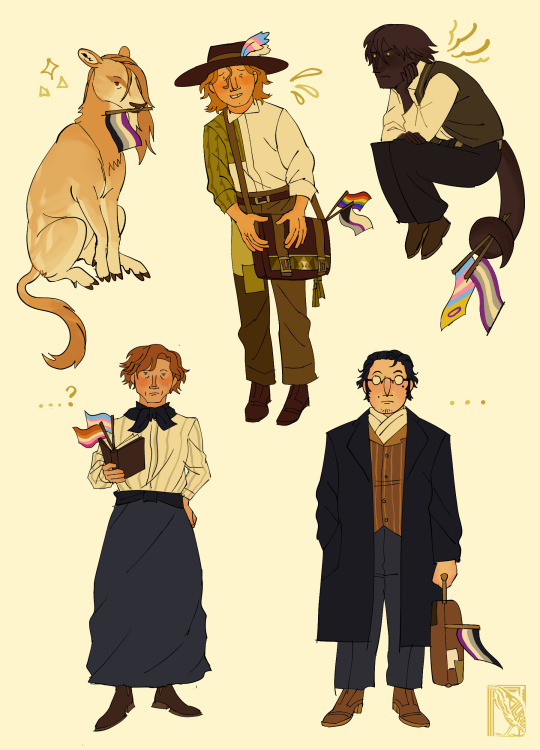
june sillyness
#oc#original character#doodle#pride#pareidolia tag#oc: selma#oc: folke#oc: arvo#oc: karoliina#oc: jan#Me making ocs and fighting to not put them on the ace spectrum LOL#ive never drawn my guys actually with the pride flags just like. drawn them normally and put pride flags next to them LOL#technically its june for me now HAHA (me awake at 2 am)#also i was debating whether or not to put intersex on arvo bcs like#technically his species is inherently intersex (altho they probably have vaguely intersex conditions too)#but i guess that by human standards/classification they would be considered intersex...
323 notes
·
View notes
Text
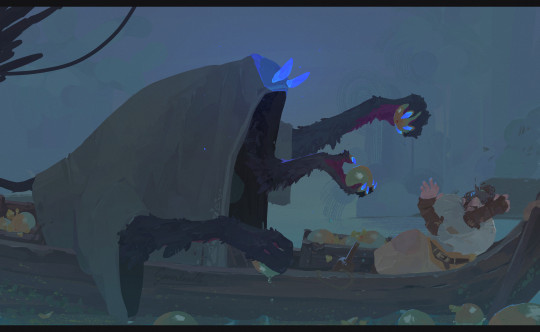
speaking of never finished wips ... well, i never ended up finishing this one so heres as far as i got
(original art, characters; (left) Shargon he/they, (right) unnamed fruit-merchant)
#ganondoodles#art#original art#original character#demons#still dont know what to tag my original art with lol#people seemed to like the wip alot -considering its oc art- but never worked much more on it sadly#i think i redid part of the merchant so some lighting is missing now bc i havent gotten to adding it back#and the entire background is basically non existent jkdfnkjgndfkjgnd
241 notes
·
View notes
Text
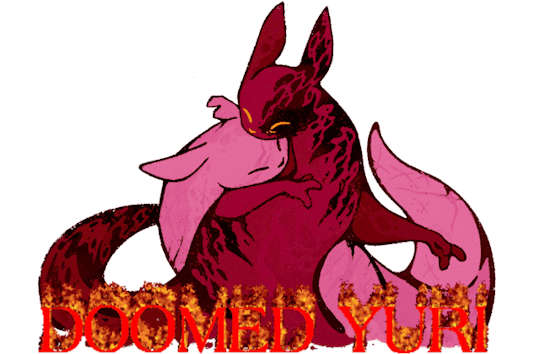
In honor of the @rw-ship-showdown I wanted to write about Artihunter as someone who jokingly slapped them together pre-downpour and still thinks they are actually very compelling. Just not in the super soft love wins kinda way (Although I get why people like that more) And the only way I know how to do that is talking too much so heres a far too long slug essay-
Obviously the slugcats don't offer a ton of characterization but theres not nothing to work with. Their stories, whether by their roles in it or the overarching themes do provide a backbone to work with. Even gameplay itself can provide a bit. (for some more than others) Hunter, to me, is ultimately a story about selflessness. The goal is to revive Moon, which is very much an act of kindness from both Hunter and NSH. But the weight of that action is much more significant for Hunter- Hunter is deeply sick. They're on the clock, and for all their skill in combat none of that will ultimately help them to survive longer than their body can hold out. Moon is a close friend of NSH but that means little Hunter- Hunter really gets next to nothing out of helping them, and ultimately pays quiet a bit spending their limited time alive fighting to deliver that neuron so that someone else can live.
To spend ones limited days on helping another, in a game that very much stresses the unwavering cruelty of the world and nature- is pretty notable. (And you could even say that Hunter being the Hardmode of Rain World adds another layer to this)
And then we have Artificer. A storyline that very much stands out to people as more… villainous (so to speak) than the other slugcats. Artificer's story covers a lot of things. Trauma, violence, revenge, etc. Revenge is a bit of a selfish desire- That need to see someone hurt as they have hurt you. A punishment that ultimately does not fix whatever harm was done- but feels good to see because you were hurt and now those responsible share that pain.
Artificer's actions are founded in that need for revenge, their pups killed for overstepping boundaries they didn't know existed. Is it not fair for them to be angry at that, to punish the scavengers for their violence with their own? Why should the scavengers ever be forgiven when they and their pups were not? And that's how you get that loop- Harm for harm over and over.
The original action has been lost in a spiral of violence for violence. And here stands Artificer- their very spirit scarred. Not just because they sought revenge, but because they never ceased trying to scratch that itch for violence as an answer. Artificer only has two paths for their story- killing the scavenger king (Someone who, really, has little to do with the original 'crime' of the scavengers, but represents an important individual to them- as did the slugpups to Artificer), locking themselves as karma one for good and spending the rest of their life chasing creatures that no longer even fight back in a warped sense of closure- or to dissolve themselves in the acids of the void sea because they're too far gone to find any real peace.
They can't meaningfully recover from that state, not alone, twisting in on themselves. Even if they halt their actions, they've been using violence as a feeble defense against their own pain- violence that no longer has any real direction or basis. Artificer gets no real closure from killing the scavenger king. All they can do is continue the cycle, or try to scrub it away. No real peace in a prison of their own making. So you have a creature, who even with a strict timer on their life- a body that will crumble to disease, spends its last bit of time on saving another. And another who was so caught up in the pain of loss that were eaten alive by their own anger, poisoned their own soul on such a deep level even self-proclaimed gods have no solution for them. What peace can they offer each other? For Hunter, its only a fleeting moment of happiness- of selfish love, before their own body fails them. A bit of indulgence in something for themself. For Artificer, its a single, comforting thread to ground them again, something tangible to protect and care about again. But thats a thread that will ultimately be snapped under the cruel indifference of the world. Hunters timer will tick down regardless of if it takes another with it. Its a tragedy- its doomed to end badly. Whatever good it offers to either of them to find each other will only provide the fleeting comfort of a band-aid that will be ripped away too early. But all that can be worth indulging in anyway, if only for the moment. It doesn't change the ending, but the ending was never going to be happy. Its can so yuri
#rain world#rw shipping#tagging that just cause this is explicitly about that even though I usually dont do shipping stuff#with that said i dont even think this particular interpretation of a possible dynamic needs to be romantic its just kinda#about companionship in general. companionship thats going to absolutely shred an already unstable slug emotionally but thats#the point. friendship and love in spite of the unavoidable ending#just noticed this is like 80% theme analysis and 20% 'these go together just trust me'#but also theyre both girls because i want them to and also because im channeling hornet from hollow knight#who made me so deeply ill that my rain world tags still havent outcompeted my Hk tags because i drew her so much. so so much.#hunter is hornet coded to me and artificer is like if angela and gebura from lc combined into a deeply fucked up ferret#also i did tag the poll because they kinda inspired this but also. i wasnt gonna put all this out here WITHOUT a readmore thats embarassing#but i guess this is propaganda for a ship already seen as popular but like... idk i think theres something to it even as someone#who did literally slap them together originally because they were both red slugcats i considered girls. predownpour so we didnt have anythi#anyway hi tag readers i have so much work to do im being bad by writing about gay slugs. i need to get myself together#its so late this might just be nonsense bwaaaaaaa
669 notes
·
View notes